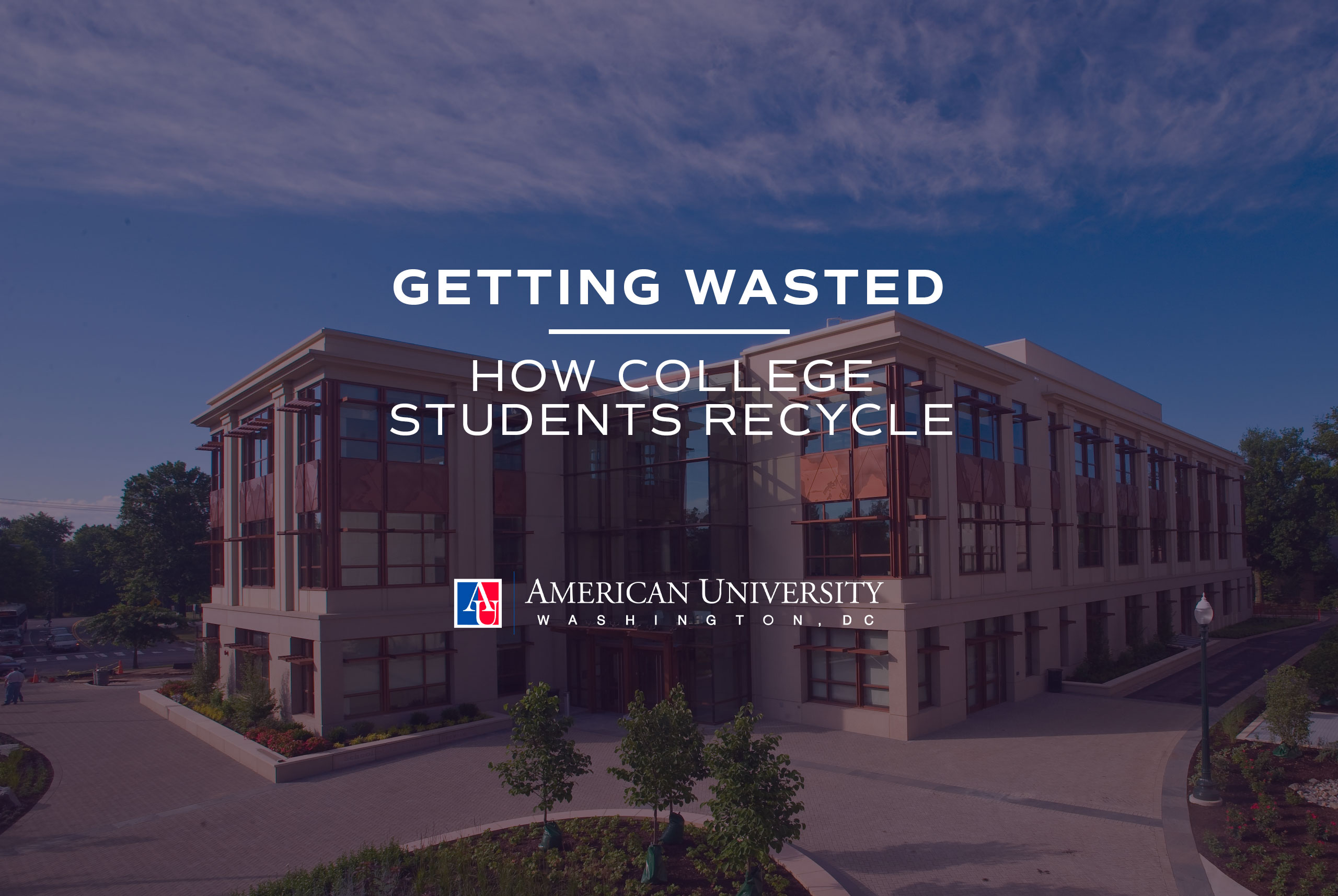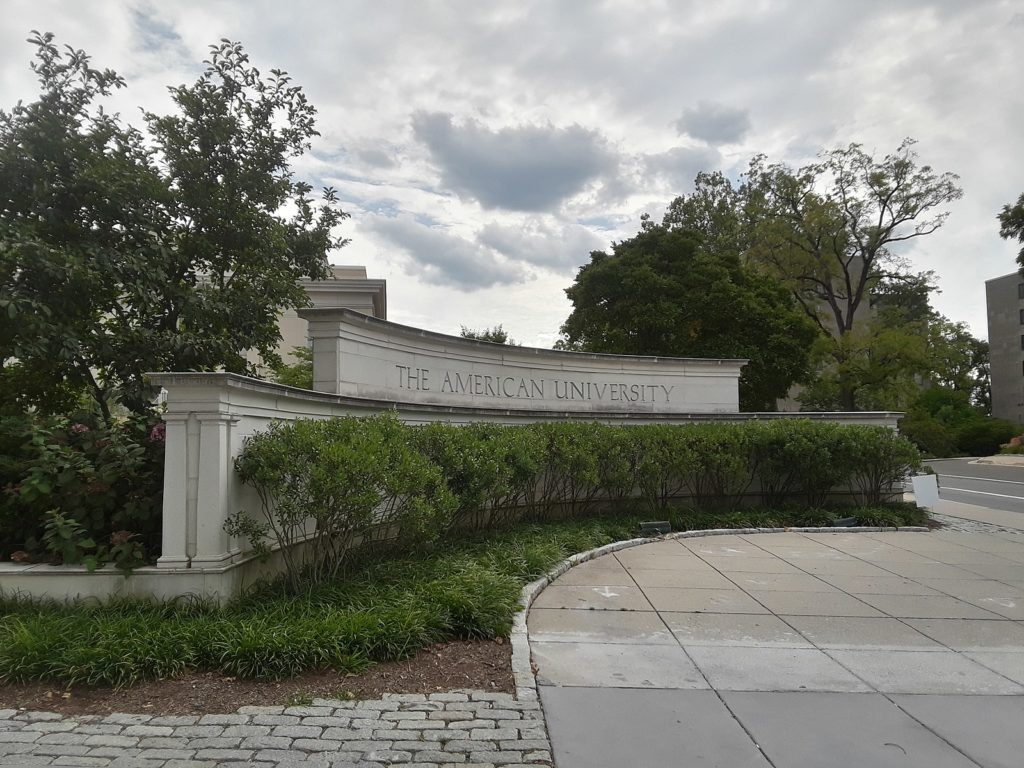Getting Wasted: How College Students Recycle at American University

College campuses have historically been a breeding ground for waste, due to outdated recycling methods, investment in fossil fuels, and carbon intensive energy costs. American University has changed this narrative, becoming the first carbon neutral higher education institution in the United States and implementing the best college recycling program in the nation.
Revolutionizing Campus Sustainability
I am currently a sophomore at American and my campus’ green policies can be felt in student life. In its path to achieving carbon neutrality, American has invested in programs that allow students to be active participants in sustainability. The university cites three strategies for becoming carbon neutral: reduce or use, renewable energy, and offset the rest. This three-pronged approach holds students accountable, motivating us to become more responsible citizens on our campus, but also pushes campus leaders to invest in programs that make our campus what it is.

Reduce or Use
The reduce or use plan is American’s most direct form of carbon neutrality. These programs begin from the ground up and truly engage the student body. In every dorm hall, restaurant, and building on campus there are compost, recycling, and landfill bins. These bins provide infographics on what can be placed in each and are the central aspect on the campus’ zero waste policy. We take these bins very seriously and it’s common for someone to turn around and ask, “Can I put this in here?” to make sure our waste is being disposed of correctly.
American also provides many opportunities for students to be conscious consumers, with farmers markets once a week and sourcing our dining hall food from local farmers. These programs reduce the waste generated by dining, but more importantly remind us to be more aware of where we’re getting our food from.
Still, there are opportunities for improvement in American’s reduce or use program. While recycling practices are available on campus, the school has not yet opted to phase-out single use plastics. The University of California has recently announced that it will end the use of single-use plastics at ten campuses and five medical centers by July of 2022. This more aggressive policy will have several environmental impacts and reduce risk of incorrect recycling and pollution. American University has not yet implemented such a policy, but its comprehensive recycling programs are a step in the right direction of zero waste.
Renewable Energy
American University has made the switch to 100% renewable energy by implementing solar panels on its buildings, routing renewable energy from local plants, and purchasing renewable energy credits. Ten of the university’s buildings feature solar panels which heat water used in student’s dorm halls, on campus restaurants and generate electricity. The development of such energy saving techniques have allowed for the university to dramatically decrease greenhouse gas emissions and lower its annual electricity bill. Green infrastructure is a key component of more sustainable colleges and universities, American has truly led the way in that regard.
Offset the Rest
American University uses a policy of offsetting whatever carbon emissions it cannot eliminate on campus by funding other sustainability initiatives. Due to limited technology it is not entirely possible for the university to operate without any carbon emissions, but the university can still claim carbon neutrality by purchasing carbon credits. Carbon credits are tradable permits that are given if an institution participates in programs that reduce carbon emissions equivalent to what they omitted.
The university has acquired carbon credits through programs such as community tree planting programs across the District of Columbia. These programs are highly effective in motivating students to be active members of their communities and take accountability for the contribution to carbon emissions. One of the first activities available to freshmen is Explore DC, where students can choose from several social issue areas and engage in one day of service in the district. One of the most popular areas of service is environmental sustainability, in which students participate in the acquisition of carbon credits, by planting trees and increasing green space in the city.
American also has developed a program to offset its carbon footprint caused by study abroad programs. International travel is a major contributor to greenhouse gas emissions. With study abroad being a major part of American culture, the school has worked offset this. American has invested in the Paradigm Project, which provides more efficient wood-burning stoves to families in Kenya to better their community air quality and to reduce deforestation. Programs like this are important to the wellbeing of study abroad and motivate students like me to be an active participant.

Campus Culture
American University has proven itself as a leader in sustainability on college campuses. Many students, like myself, were drawn to the school because of its commitment to a greener future. This has produced a campus of solutionists, motivated to better the community and the world at large. There have been several student-led protests against American’s previous investment in the fossil fuel industry, sparking a larger movement in the environmental community to hold universities accountable to their participation in the industry. In April 2020, after pressure from its students, American University finally made the commitment to eliminate all fossil fuel investment in its endowment. This was a major success for us and I am proud that my university listens to the voices of its community.
American is also home to many student organizations that are fighting for sustainability such as AU Zero Waste club, community gardens, and my favorite, the Beekeeping Society. These organizations are very popular among students and truly make a difference in the school’s path to finding solutions to the climate crisis.
American University is a role model for universities across the globe. I am proud to attend a university that shares my passion for finding solutions to a more sustainable future. American is not the only university capable of making this switch, by being an advocate for sustainability. Educating your peers on recycling, joining on-campus environmental groups, and being an advocate for a more sustainable campus culture can revolutionize your college’s environmental practices. Be part of the solution on your college campus.


Leave a Reply